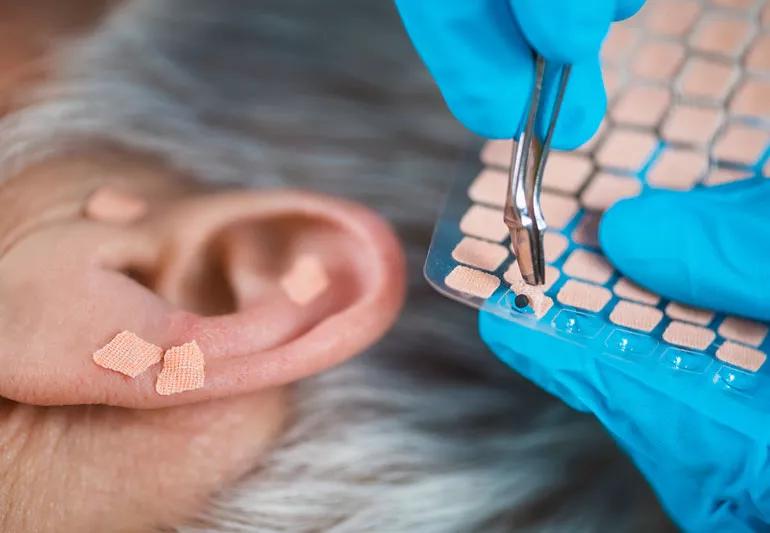Acupuncture, herbs and hypnotherapy curb cravings naturally

Image content: This image is available to view online.
View image online (https://assets.clevelandclinic.org/transform/31e1168c-4637-47e6-bc74-39a2858a84be/acupunctureSmokingEar-1158235603-770x553-1_jpg)
ear beads acupuncture for smoking
Quitting tobacco is one of the most important things you can do to improve your health. But the road to get there isn’t always easy. If you’re trying to quit smoking, acupuncture is a natural way to help you curb your nicotine cravings.
Advertisement
Cleveland Clinic is a non-profit academic medical center. Advertising on our site helps support our mission. We do not endorse non-Cleveland Clinic products or services. Policy
Acupuncture, along with Chinese herbs and hypnotherapy, may not be as well-known as nicotine patches or gum. Yet they all can offer relief, especially in the active phase of withdrawal when you’re wrestling with fatigue, irritability and gnawing cravings.
“Some people try acupuncture because they cannot tolerate the drugs used for tobacco cessation,” says acupuncturist Jamie Starkey, LAC. “Unlike prescription medications, acupuncture has no side effects. In fact, it’s very common to notice side benefits like improvements in sleep or mood. Others use acupuncture as part of an overall strategy to quit.”
Acupuncturists target certain areas of the body for certain conditions. When it comes to helping smokers quit, pressure points in the ears are especially effective in suppressing cravings. The National Acupuncture Detoxification Association even has an entire protocol around this set of ear suppression points to combat addiction.
In between acupuncture treatments, you can also use ear seeds at home — which work as a form of acupressure. This involves placing tiny balls on your ear with adhesive tape in targeted areas. This technique allows you to self-treat by applying pressure to points on the ear to help temper the urge to smoke.
Advertisement
“The cranial nerves, accessed through the ears, stimulate the nervous system to suppress the urge for cigarettes,” explains Starkey. “We’re trying not only to suppress cravings, but also to engage the relaxation response. We’re really manipulating the body using needles and targeted pressure to help support people as they work through withdrawal symptoms.
After acupuncture, you may have fewer cravings, decreased irritability, improved mood, improved bowel movements and improved sleep.
The goal of acupuncture is to help curb any cravings you have for the nicotine itself.
“Generally, I tell patients to be tobacco-free for at least 24 hours before their first consult for acupuncture,” says Starkey. “If they take that step, this tells me they have the mindset it takes to be tobacco-free. Many times, a patient’s spouse has scheduled the appointment, or peer pressure spurs them to come in, and they’re not really ready.”
It’s important to be mentally ready to quit and that means being OK with the idea of throwing away those cigarettes.
“Once patients are committed, I start seeing them two or three times per week in the beginning,” she says. “Then the visits taper to once a week as withdrawal symptoms fade. Eventually, visits are discontinued altogether when they are tobacco-free.”
Before your first visit, be sure to check with your acupuncturist for protocols regarding the coronavirus pandemic (COVID-19).
Acupuncture is even more effective when used together with other integrative medicine techniques. These may include:
“However you choose to find help, whether through a tobacco cessation program, acupuncture, herbs, hypnotherapy or a combination of methods, it’s all worthwhile in the long run,” says Starkey.
Advertisement

Sign up for our Health Essentials emails for expert guidance on nutrition, fitness, sleep, skin care and more.
Learn more about our editorial process.
Advertisement
Vaping exposes you to thousands of chemicals, including many that are known to cause cancer and lung disease
Smoking can make symptoms from cancer treatment worse, and can even make treatments less effective
From dental diseases to cardiovascular problems, the harmful effects of smoking hookah have plenty of downsides for your health
Even only a couple cigarettes a day can lead to potentially deadly lung diseases like COPD and emphysema
Your risk goes down once you quit, but you may still need a lung cancer screening
Cigarettes increase your risk of developing the condition and worsening its effects
Health benefits start within 20 minutes and continue to grow for years after
Each comes with substantial health risks and should be avoided
Prioritize your health by managing stress, strengthening your social connections and getting quality sleep
Bolsters, blankets, pillows and blocks can offer extra support, stability and comfort
Allergies, postnasal drip, asthma or reflux could be to blame for a cough that won’t quit